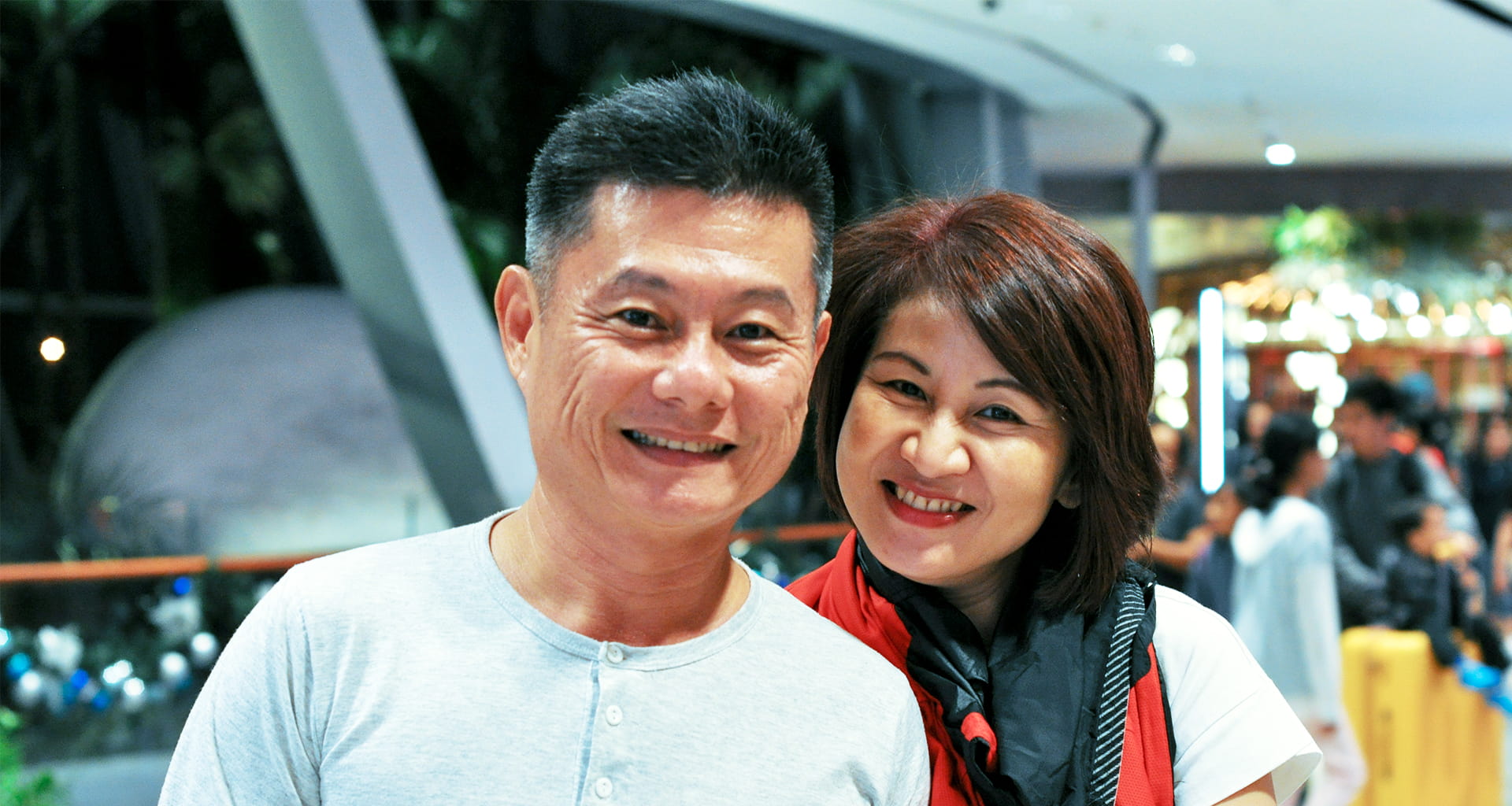
As Joseph and Joni Oh watched their son Jonas fervently worshipping God at a Sunday morning service, they felt both moved and proud.
The youngest of their three children had just come back from attending their church’s youth camp, and here he was, dancing and singing.
Little would they know that within a few weeks, they would face their biggest parenting crisis.
“We thought we did a good job as Christian parents,” says Joni. “We would try to impart all the godly values, as much as we knew how.”
A few weeks after that service in 2013, as he entered a new school term, Jonas started to lose interest in his studies.
His parents later found out that the Secondary 2 student had felt inadequate because he was not able to get into the same school as his siblings.
Coupled with major changes that happened in the school that year, it caused him to give up all efforts in his studies.
Jonas began going to school late or even played truant, and his parents had to frantically comb the neighbourhood to find him and drag him back to school.
He also frequently got into trouble.

(From left) Zenas, Joseph, Tryphena, Joni, and Jonas.
In one incident, after he stood up for a friend who’d been confronted by the school’s discipline master, he and his friend used some threatening words and exhibited violent behaviour.
The school, suspecting that they were involved in gang activities, called the Secret Societies Branch to take both boys to the police headquarters.
Soon after, Jonas decided not to go back to school. By this time, his parents were at their wits’ end.
“It came to a point where it became emotionally draining getting him back to school,” Joni says.
Her thought at that time was, “It’s pointless trying to get him to school—because when he went to school, he would get into trouble and end up being sent back home.”
She and Joseph hoped that Jonas would just stay at home, but he continued to hang out with his friends late into the night, sometimes returning home at dawn.
He also challenged his parents’ authority, joined a street gang, and started smoking.
“It was a blow to me, to see my son change for the worse like that,” says Joseph.
“I Disown You”
But, Joseph adds, the fear of losing his son may have prompted him to respond inappropriately.
He tried to control Jonas even more—but that was exactly what Jonas did not want.
“I couldn’t take it,” recalls Joseph. “The more I couldn’t take it, the more I wanted to bring him back home. The more I wanted to bring him back home, the more resistance there was from him.”
At one point, Jonas told his father: “This is my life, leave me alone. Just let me go.”
Joseph tried to exert his authority, saying: “I am your father.”
Jonas replied: “Then I disown you.”
Those words hurt Joseph deeply. Despite his best efforts, his dream of a happy family was shattered.
“I was completely beaten to Ground Zero,” says Joseph. “I felt really worthless. I felt that I had failed as a man, a husband, and a father. I even fell into depression without knowing.”
It was through this struggle, however, that both Joseph and Joni would learn some lessons about parenting, pride, faith, and their walk with God.
A Father Learning To Trust In God’s Promise
Through a couple who prayed with him and his wife, Joseph was reminded that “love is patient, love is kind” (1 Corinthians 13:4).
He felt convicted that he had not displayed such qualities in his relationship with his son.
“All I wanted was for him to fit into the mould of a godly son, and when he did not, I flared up at him,” Joseph says.
“Many times when we had fierce arguments, I thought of chasing him out of the house, but Joni reminded me that we should keep the door open for him to return home.”
“Many times, we parents always feel that we don’t do enough. So we try to do as much as we can, not realising that the more we do, the more we’re pushing our children away, and the more we’re preventing God from doing His work.”
Other verses that spoke to him were Romans 1:22, which prompted him to reflect that what he thought was wise could have been foolishness, and Mark 9:25-29, in which Jesus stressed the power of prayer.
This account inspired Joseph to fast and pray for 40 days.
When he asked God what He was teaching him, the word “promise” came to mind.
“It was a clear sign to me that His promises never fail,” Joseph says. “From there, I learnt to totally let go and let God.”
In September 2015, Joseph attended a prayer meeting held by Elijah7000, a movement in Singapore that equips Christian fathers.
There, he heard the fathers reciting verses from Malachi 4:5–6. Part of that says: “He will turn the hearts of the fathers to the children, and the hearts of the children to their fathers” (NKJV).
This verse shook Joseph.
“I’m also a child of God, and God’s heart has always turned to me,” he says.
“The question is—is my heart turned completely to the Father?”
So, instead of focusing on his son’s behavioural problems, Joseph began to turn his focus onto his own personal relationship with God, spending more time in the Word and prayer.
A Mother Who Prayed With Fear And Trembling
God had also showed Joni that the father’s heart needed to change before the son’s heart would.
But she also knew that telling Joseph to change his tone and style of discipline could hurt his ego, especially as his feelings were particularly fragile then.
So she did the only thing she could.
“A wife’s most powerful tool is to pray,” she says. “That was all I could do. I told God: ‘You have to tell him Your things. I can only pray.’”
Joni also tried to keep quiet in discussions with her husband, to avoid having disagreements that would lead to quarrels.
She also tried to hide some of her stress and anxiety. But this caused tension in their communication.
“At times, I was so calm that I appeared to him to be indifferent about his feelings,” she says, “but it wasn’t true. Whatever he told me, I took it to the Lord in prayer.”
In truth, Joni had been crying too, mostly in prayer.
She also cried for her son. “I poured out all my fear and anxiety for my son to God. I knew that God would be the one watching over him.”
“I’m glad I learnt to first change myself, especially my mindset of many things in regard to Jonas, instead of expecting Jonas to make the change first.”
In one of her intense prayers to God, shortly after Jonas had again told his parents to let him go, she told God: “Okay, I’m letting him go. You’re going to watch over him as I know You’re going to finish the work, and You’re going to bring my son back.”
Each time she learnt of a new vice that Jonas had picked up, she tried not to nag him, but took her concerns to God in prayer instead.
“Whatever we needed to say as parents, we already said it. But the more we said it, the worse it got. So it came to a point where we just kept praying for him,” she says.
“My prayer to God was: ‘Whatever You allow him to go through, let it just be a touch-and-go experience, and not let him fall too deep into it’.”
God answered that prayer.
Jonas fell off his e-bike several times, but did not suffer any major injuries. He got into several gang fights, but nothing serious happened too.
But Joni still had to struggle with prayers that seemed to go unanswered, and the seeming lack of progress in her son.
“Sometimes, I saw an improvement of 10 per cent, then after that, things seemed to get worse by 90 per cent,” she recalls. “I didn’t know what to pray anymore.”
“Whatever we needed to say as parents, we already said it. But the more we said it, the worse it got. So it came to a point where we just kept praying for him.”
At such times, Romans 8:26 gave her assurance and led her to speak in tongues when she could not find the words to pray: “In the same way, the Spirit helps us in our weakness. We do not know what we ought to pray for, but the Spirit himself intercedes for us through wordless groans.”
There were also times when Joni admitted to being “scared of praying”, but she persevered.
“It was a testing of the faith and perseverance in praying, but I just had to hang on and keep praying,” she says. “I also realised that for every small breakthrough, as I learnt to give thanks and see it in the light of God, then there was no fear.”
The Return Of The Prodigal Son
Over the next two years or so, Joseph tried to be more patient and kind with his son.
When Jonas reached home late, for example, Joseph would cook supper for him. This went on for about two months before Jonas said, “Thanks, Pa”, for the first time.
It was just two words, but to Joseph, it was a great joy and comfort.
They spoke volumes about the progress in his relationship with his son and moved him to tears.
“That meant a lot to me,” says Joseph. “It touched my heart. At that point, I thought to myself, ‘It is all worth it.’
I’m glad I learnt to first change myself, especially my mindset of many things in regard to Jonas, instead of expecting Jonas to make the change first.”

Joseph and Joni.
Another thing that helped Jonas was a programme that took youths associating with gangs on a one-day tour of a prison and had them sit in a prison cell for a few hours.
This, Joseph and Joni believe, left a deep impression on their son.
They also tried to keep in touch with Jonas’ friends, who saw that the parental love and family warmth that Jonas had were different from their own experience.
According to Jonas, some of them asked him: “What are you doing with your life? You can study, you have a good family, and your parents love you so much. Why are you doing this to your family?”
Sometime around end-2016, Jonas told his parents that he was ready to go back to school. He went to a private school, where he sat the O levels the next year and did well enough to enter a polytechnic.
Letting The Lord Do His Work
Today, God is still working on Jonas.
Now studying in a polytechnic, the 19-year-old won an Edusave award for progress in his academic performance in 2019.
He still smokes and does not attend church regularly. But Joseph and Joni continue to let go of their control and trust in God’s timing.
“This is my life, leave me alone. Just let me go.”
“When we learn to let go, the Lord is able to do His work,” says Joni. “Many times, we parents always feel that we don’t do enough. So we try to do as much as we can, not realising that the more we do, the more we’re pushing our children away, and the more we’re preventing God from doing His work. We have to realise that everything is in God’s hands, including our children.”
This includes knowing when to step back on parental control over their children’s life stages.
“Parents’ timelines are usually very structured—children should finish certain things by a certain age, like finish O-Levels by 16,” she notes. “But we have to let that go as well; God’s timeline is better than ours.”
Joseph and Joni have also learnt that storms in their lives can refine their faith and teach them to rely less on their efforts and trust in God to change their son’s heart and behaviour.
“Through all these episodes, Jonas has definitely become a better person,” says Joni. “Though he’s not back in church regularly, we believe that one day, when he is ready; his heart will be totally for the Lord.”
Tips
- Listen to them and try to understand the thinking behind their actions.
- Assure them that they are always part of the family.
- Cast your anxieties on God and keep praying.
- Let go of your efforts to control your child’s behaviour: remember that God can change their heart and behaviour.



